


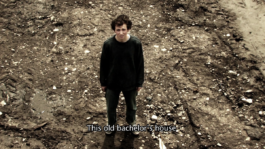
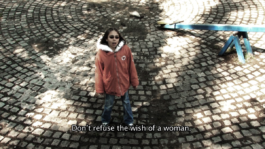
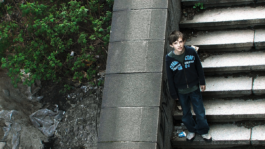
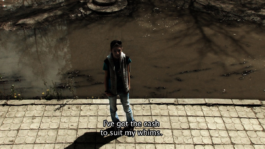
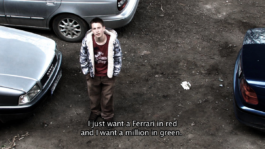
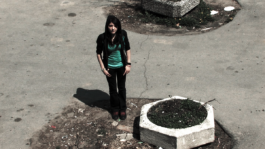
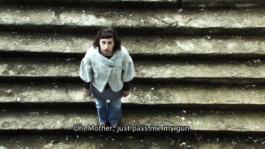
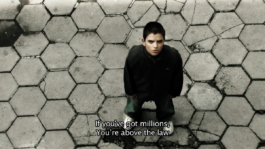
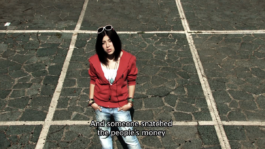
HD VIDEO, 2009
HDCAM OR DIGIBETA, 11MIN., HDV, COLOR
Written, directed and produced by
Borjana Ventzislavova
with Sirma Deianova, Victoria Gasheva, Eliza Gramatikova, Nedelcho Hazarbasanov, Pavel Hazarbasanov, Pavel Koulev, Iva Pavlova, Alexandra Stoyanova, Kristian Trenov
The project deals specifically with the poetry of Chalga songs, in the 90s and the Beginning of 2000. It reports mainly due to the sexist and pornographic aggressive manner about the political, socioeconomic and cultural reality in Bulgaria.
The work shows 9 young people in different scenes in Sofia city reciting lyrics from Chalga songs. The backgrounds show scenes from neglected urban landscapes and concrete broken streets, paved paths with holes, patches disorderly, muddy ground ... typical circumstances for the ordinary man in the capital city.
The work focused on this part of the younger generation, not necessarily fascinated by the Chalga culture. Those who can’t identify and hold responsible the older generation - their parents, their teachers, politicians - for the spreading of this phenomenon to normality in the Society.
Production Assistans: Xenia Vargova
Sound: Veselin Zografov
Camera, Editing: Borjana Ventzislavova
SUPPORTED BY
BMUKK / AUSTRIA, ALTERA, ART AFFAIRS AND DOCUMENTS / BULGARIEN
_
Chalga is a Bulgarian version of turbo folk. Since the early 1990s, the driving, cheap Balkan sounds mixed with traditional drum rhythms and their aggressive obscene texts have been the mass market soundtrack for post-socialist life in Bulgaria. Chalga lyrics channel desires for fast cars, nasty money, and sex.
In High Blue Mountains, Rivers, and Golden Plains, Sofia born artist Borjana Ventzislavova sets a minimalist, performative cinematic language opposite the chalga phenomenon and its visualizations, which are omnipresent in music videos, advertising, and night clubs, and range from trash to the realm of pornography. Ventizslavova has composed and confident teens and young adults step into the picture. Like model pupils reciting their memorized lessons, they halter, stutter, stammer, and rattle off chalga slogans into the camera. They gaze directly and yet distantly into the lens: a young man standing between parked cars dryly recites: 'I just want a Ferrari in red, and I want a million in green...and I want a chick a day,' thus exposing the content of chalga as hard, crude facts.
In her critical position with regard to chalga, the artist refrains from including any accompanying, thumping beats. The nearly lyrical images underlie the street atmosphere of the capital Sofia, where weeds in the cracks of the concrete, the rundown parking lots, and reflections of dirty rain puddles offer a stage for Ventizslavova's young protagonists.
Estimated is that at least 80 percent of all Bulgarians know at least one chalga text by heart. Borjana Ventizslavova carries out a sober, poetic game with collective memory and pop culture, which serves as metaphor for Bulgaria's transition from socialism to turbo capitalism. (Petra Erdmann)
Translation: Lisa Rosenblatt









HD VIDEO, 2009
HDCAM OR DIGIBETA, 11MIN., HDV, COLOR
Written, directed and produced by
Borjana Ventzislavova
with Sirma Deianova, Victoria Gasheva, Eliza Gramatikova, Nedelcho Hazarbasanov, Pavel Hazarbasanov, Pavel Koulev, Iva Pavlova, Alexandra Stoyanova, Kristian Trenov
The project deals specifically with the poetry of Chalga songs, in the 90s and the Beginning of 2000. It reports mainly due to the sexist and pornographic aggressive manner about the political, socioeconomic and cultural reality in Bulgaria.
The work shows 9 young people in different scenes in Sofia city reciting lyrics from Chalga songs. The backgrounds show scenes from neglected urban landscapes and concrete broken streets, paved paths with holes, patches disorderly, muddy ground ... typical circumstances for the ordinary man in the capital city.
The work focused on this part of the younger generation, not necessarily fascinated by the Chalga culture. Those who can’t identify and hold responsible the older generation - their parents, their teachers, politicians - for the spreading of this phenomenon to normality in the Society.
Production Assistans: Xenia Vargova
Sound: Veselin Zografov
Camera, Editing: Borjana Ventzislavova
SUPPORTED BY
BMUKK / AUSTRIA, ALTERA, ART AFFAIRS AND DOCUMENTS / BULGARIEN
_
Chalga is a Bulgarian version of turbo folk. Since the early 1990s, the driving, cheap Balkan sounds mixed with traditional drum rhythms and their aggressive obscene texts have been the mass market soundtrack for post-socialist life in Bulgaria. Chalga lyrics channel desires for fast cars, nasty money, and sex.
In High Blue Mountains, Rivers, and Golden Plains, Sofia born artist Borjana Ventzislavova sets a minimalist, performative cinematic language opposite the chalga phenomenon and its visualizations, which are omnipresent in music videos, advertising, and night clubs, and range from trash to the realm of pornography. Ventizslavova has composed and confident teens and young adults step into the picture. Like model pupils reciting their memorized lessons, they halter, stutter, stammer, and rattle off chalga slogans into the camera. They gaze directly and yet distantly into the lens: a young man standing between parked cars dryly recites: 'I just want a Ferrari in red, and I want a million in green...and I want a chick a day,' thus exposing the content of chalga as hard, crude facts.
In her critical position with regard to chalga, the artist refrains from including any accompanying, thumping beats. The nearly lyrical images underlie the street atmosphere of the capital Sofia, where weeds in the cracks of the concrete, the rundown parking lots, and reflections of dirty rain puddles offer a stage for Ventizslavova's young protagonists.
Estimated is that at least 80 percent of all Bulgarians know at least one chalga text by heart. Borjana Ventizslavova carries out a sober, poetic game with collective memory and pop culture, which serves as metaphor for Bulgaria's transition from socialism to turbo capitalism. (Petra Erdmann)
Translation: Lisa Rosenblatt